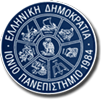Constantza
Merchant courts of Justice

Author: ARDELEANU KONSTANTIN
When Romania acquired Dobrudja in 1878, a complex system of justice was instituted in the entire province. A Communal Court and an Appellative Court were established at Constanţa, the county capital, and in every plasa (an intermediary administrative unit between the commune and the county) there existed a Muslim court. The Appellative Court was made up of a president, two members, a substitute, a prime procurator, a procurator, a registrar and several assistant registrars. The first members of the Appellative Court, inaugurated on 25 November 1878, were Ioan Pretor – president, S. Hociung and Grigore T. Brătianu – members, St. Plopuşoreanu – substitute member, Ioan T. Burada – prime–procurator and Alex. Serghie – procurator. All these courts were also responsible with judging commercial disputes.
This juridical organisation was changed by the “Law on the Courts of Dobrudja” (30 March 1886) which instituted a communal court in every commune, a regional court in each plasa and a district court in the two county capitals. The Muslim courts from Constanţa and Tulcea were preserved [1]. At the same time, Dobrudja was placed under the jurisdiction of the Appellative Court of Galaţi [2]. After the second Balkan War, when Romania annexed Southern Dobrudja from Bulgaria, an Appellative Court was founded at Constanţa (1914) for the entire province, with similar competences (in civil, commercial and correctional cases) as the appellative courts in the rest of Romania [3].
After the establishment of the bourse in 1898, commercial disputes were judged by a commision a l’amiable, instituted by the involved parties. In 1910 a Chamber of Arbiters and Conciliation was organised, and the first trial took place on 22 June 1910. This institution judged 20 cases in 1910, then 19, 10, 11 and 17 in the years until the outbreak of World War One [4].
[1] Ibram Nuredin, Comunitatea musulmană din Dobrogea. Repere de viaţă spirituală. Viaţa religioasă şi învăţământ în limba maternă (Constanţa: Ex Ponto, 1998), 130.
[2] M. D. Ionescu, Cercetări asupra oraşului Constanţa. Geografie şi istorie (Bucharest: Tipografia şi Fonderia de Litere Thoma Basilescu, 1897), 52–54.
[3] Stoica Lascu, Mărturii de epocă privind istoria Dobrogei (1878–1947), vol. I (1878–1916) (Constanţa: Muzeul de Istorie Naţională şi Arheologie, 1999), 644–651; Constantin Cheramidoglu, “Curtea de Apel Constanţa, o instituţie centenară”, Poliţia Impact, May 2014, 16–17.
[4]Monografia Camerei de Comerţ Constanţa. La 130 de ani de la înfiinţarea primei Camere de Comerţ a Dobrogei, la Constanţa, şi la 20 de ani de la reînfiinţarea Camerei constănţene, edited by Ion Dănuţ Jugănaru, Adriana Barothi, Rodica Belteu, Adriana Doga, Ruxandra Serescu (Constanţa: Editura Dobrogea, 2010), 29–30.
References
Cheramidoglu, Constantin, “Curtea de Apel Constanţa, o instituţie centenară” [The Appellative Court of Constanţa, a Centenary Institution], Poliţia Impact, May 2014, 16–17.
Firoiu, Dumitru, Liviu P. Marcu (editors), Istoria dreptului românesc [History of Romanian Law], vol. II, part 1 (Bucharest: Editura Academiei Republicii Socialiste România, 1984).
Ionescu, M. D., Cercetări asupra oraşului Constanţa. Geografie şi istorie [Researches on the City of Constanţa. Geography and History] (Bucharest: Tipografia şi Fonderia de Litere Thoma Basilescu, 1897).
Monografia Camerei de Comerţ Constanţa. La 130 de ani de la înfiinţarea primei Camere de Comerţ a Dobrogei, la Constanţa, şi la 20 de ani de la reînfiinţarea Camerei constănţene [The Monograph of the Chamber of Commerce of Constanţa. At 130 Years Since the Foundation of the First Chamber of Commerce in Dobrudja, at Constanţa, and at 20 Years Since Its Reestablishment], edited by Ion Dănuţ Jugănaru, Adriana Barothi, Rodica Belteu, Adriana Doga, Ruxandra Serescu (Constanţa: Editura Dobrogea, 2010).
Nuredin, Ibram, Comunitatea musulmană din Dobrogea. Repere de viaţă spirituală. Viaţa religioasă şi învăţământ în limba maternă [The Muslim Community in Dobrudja. Marks of Spiritual Life. Religious Life and Education in the Mother
Back




